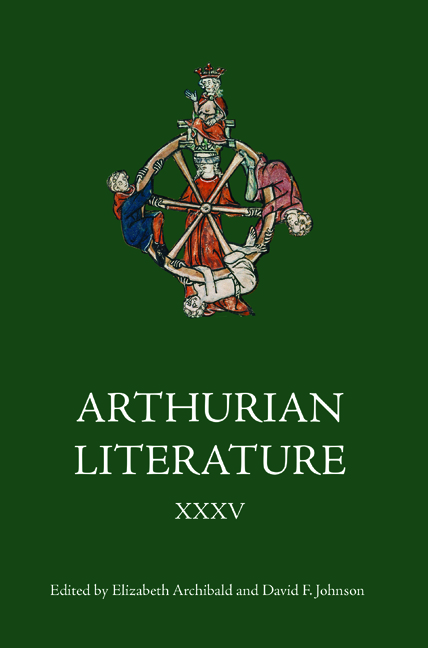Book contents
- Frontmatter
- Contents
- List of Illustrations
- General Editors’ Foreword
- List of Contributors
- I Arthurian Swords I: Gawain’s Sword and the Legend of Weland the Smith
- II Rex rebellis et vir pacificus: Civil War and Ecclesiastical Peacekeeping in the Vita Gildae of Caradog of Llancarfan
- III Once and Future History: Textual Borrowing in an Account of the First War of Scottish Independence
- IV ‘Me rewes sore’: Women’s Friendship, Affect and Loyalty in Ywain and Gawain
- V The Sacred and the Secular: Alchemical Transformation in The Turke and Sir Gawain
- VI ‘The native place of that great Arthur’: Foreignness and Nativity in Sixteenth-Century Defences of Arthur
- VII John Steinbeck’s ‘Wonder-Words’
- VIII The Once and Future King of Atlantis: The Arthurian Figure in Geoff Johns’s Aquaman: Death of a King
- IX Arthur and/or the Grail
- Miscellaneous Endmatter
VI - ‘The native place of that great Arthur’: Foreignness and Nativity in Sixteenth-Century Defences of Arthur
Published online by Cambridge University Press: 11 September 2020
- Frontmatter
- Contents
- List of Illustrations
- General Editors’ Foreword
- List of Contributors
- I Arthurian Swords I: Gawain’s Sword and the Legend of Weland the Smith
- II Rex rebellis et vir pacificus: Civil War and Ecclesiastical Peacekeeping in the Vita Gildae of Caradog of Llancarfan
- III Once and Future History: Textual Borrowing in an Account of the First War of Scottish Independence
- IV ‘Me rewes sore’: Women’s Friendship, Affect and Loyalty in Ywain and Gawain
- V The Sacred and the Secular: Alchemical Transformation in The Turke and Sir Gawain
- VI ‘The native place of that great Arthur’: Foreignness and Nativity in Sixteenth-Century Defences of Arthur
- VII John Steinbeck’s ‘Wonder-Words’
- VIII The Once and Future King of Atlantis: The Arthurian Figure in Geoff Johns’s Aquaman: Death of a King
- IX Arthur and/or the Grail
- Miscellaneous Endmatter
Summary
The present essay assesses the use of, and attitudes towards, foreign and native sources in three sixteenth-century defences of Arthur. In the sixteenth century, as in earlier centuries, the figure of Arthur was a useful tool for exploring and defining national identity. As N. J. Higham puts it, ‘to be interested in Arthur is to be interested in how “Britishness”, “Englishness”, “Welshness”, “Cornishness”, “Scottishness” and so on, have been constructed and successively revalued, both in the present and in many pasts.’ The negotiation of such identities was at a critical point in the sixteenth-century British archipelago. In particular, the century saw a tumultuous shift in Anglo-Welsh relations. Henry Tudor had ascended the English throne in 1485. This was considered a great victory by Henry's Welsh supporters, some of whom saw him as the Mab Darogan (son of prophecy). He was framed as the king to unite not only the houses of Lancaster and York, but also the states of Wales and England, claiming to descend from the royalty of both. The sixteenth-century Welshman John Prise, to whom I will return later, said: ‘Henry the Seventh … was indubitably descended from the royal stock of their [the Welsh’s] own princes. Then they began to give their allegiance to a prince who was shared by both nations, and did so willingly, not from fear but from love.’ Henry's relationship with his Welsh supporters was mutually beneficial, and after he took the throne many of the Welsh gentry flocked to London in the hope of taking offices close to the king, positions from which they had previously been excluded under statutes passed under Henry IV in 1401 following the beginning of the Glyndŵr uprising. In the next century, the unification of England and Wales was realized in the Acts of Union of 1536 and 1542. The Acts ‘incorporated, united and annexed’ Wales to England, and the Acts extended the same freedoms to the literate Welsh gentry that the English enjoyed, though with the caveat that any administrative and judicial proceedings must be carried out in English and any elected officials must ‘use the English speech or language’.
- Type
- Chapter
- Information
- Arthurian Literature XXXV , pp. 152 - 172Publisher: Boydell & BrewerPrint publication year: 2019
- 1
- Cited by



